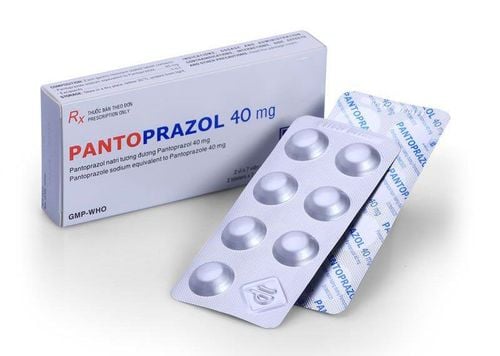This is an automatically translated article.
Children and infants hiccups are a very normal physiological phenomenon. Although this phenomenon does not have a big impact on health, if you know some ways to stop the hiccups, it will help your baby feel much more comfortable.
1. Why do babies get hiccups?
Hiccups are sudden, involuntary contractions of the diaphragm that produce hiccups, these contractions are interrupted and repeated many times. Hiccups can occur at any age from infants to the elderly.
Cure hiccups for adults is usually simple, but how to make babies stop hiccups or children stop hiccups, you need to be more careful because the child's body is still quite immature. You need to pay attention to avoid using too strong movements or using inappropriate measures such as giving your baby too much water...
Newborn hiccups can be caused by one of the following reasons:
The baby does not properly kept warm; Children have gas reflux from the stomach up causing hiccups; Children drink milk improperly: When children drink too much, milk will condense undigested or when children drink cold milk, gas will stagnate and cannot circulate, making the child's stomach function impaired. Muscle gas rises and falls erratically, leading to gas reflux, causing hiccups. Your baby feeds on breast milk too quickly or you feed or drink milk when he's finished crying, causing choking and leading to hiccups. However, the phenomenon of hiccups in young children usually only lasts for about 10 minutes, then the child's body will balance itself and stop the hiccups. If you are impatient, you can refer to some ways to make your baby stop hiccups.

Cho bú là 1 trong những cách làm trẻ sơ sinh hết nấc
2. Some ways to make children stop hiccups
“How do babies hiccup” to help babies not get upset is the question of many parents raising young children. Here are some ways to stop the hiccups:
Use your two fingers to separate the baby's ears for about half a minute or use two fingers to gently squeeze the two wings of the baby's nose, and at the same time keep the baby's mouth closed for 2- 3 seconds. Repeat this movement 15-20 times, the interval between each time is 3 seconds. Change positions when breastfeeding: If you find your baby often shows signs of hiccups after feeding, you should change your hands or change the way you hold your baby when feeding to limit the amount of air entering the baby's mouth and stomach. Pat your baby's back or shoulder gently and firmly. When the baby can burp, the hiccups will stop. You can give your child small sips of water to stop the hiccups, only about 2.5ml should be enough. If your baby is at the age of weaning, you can put a little sugar on the baby's tongue. The sweetness of sugar helps to prevent diaphragmatic spasms. If your baby is bottle-fed, you need to avoid using a nipple that is too large as this can cause your baby to swallow a lot of air while feeding.
3. Can infant hiccups be prevented?
Hiccups not only make children uncomfortable but also affect the process of eating / drinking milk of children. Therefore, you should apply the following measures to prevent hiccups from occurring in young children:
You need to keep the air temperature in the child's room stable, to avoid letting the child get cold. You can put a scarf around your baby's neck to keep out the wind. Close windows to prevent cold wind from blowing directly on young children. You can give your child a piece of ginger candy if they can suck it or put a little oil on the baby's wrists, nape, and earlobes. Note that when bathing children, do not let the water temperature be too different from the room temperature. In winter, you need to turn on the fan to make the bathroom warmer. In particular, to limit the baby's hiccups, you should note that the baby should not be too hungry before feeding, and at the same time, it is necessary to avoid letting the baby suckle too full. After the baby is finished feeding, you need to hold the baby with his head high for about 10 minutes.

“Trẻ con nấc làm thế nào” là thắc mắc được nhiều cha mẹ quan tâm
4. Children with hiccups when to go to the doctor?
You should take your child to the doctor in the following cases:
When your baby has gastroesophageal reflux disease: If your child has chronic hiccups and constantly burps out liquid, this may be a sign of acid reflux. Stomach. Children often have other accompanying symptoms including: Irritability, arching back and crying a few minutes after eating. Baby hiccups while feeding or sleeping: Newborns can hiccups for a while, but if your baby hiccups while feeding, sleeping, or playing, it's best to take your baby to the doctor. Chronic hiccups interfere with a child's daily activities and make them uncomfortable. When your baby's hiccups last for days or hours: An infant or an older child can have hiccups for a few minutes or hours. If your baby doesn't feel uncomfortable with hiccups, you don't need to worry too much. However, if the child shows other abnormalities, this can have serious consequences. At this time, you need to observe the baby's hiccups to see if the child is wheezing or not. If your child is wheezing, you should take him to the doctor right away. Normal hiccups don't have too much of an effect on your baby's health, so you don't need to worry too much. But if the baby hiccups continuously for a long time, it may signal a certain disease related to the stomach or digestion. The best way is to take your child to a reputable medical facility to find out the cause of hiccups in the child and to be guided by the doctor for effective treatment.
With many years of experience in examining and treating diseases in children, now the Pediatrics Department at Vinmec International General Hospital has become one of the major health care centers, capable of examining , screening and treatment of many specialized diseases in children. Therefore, if the child has signs of continuous hiccups for a long time or has other diseases such as infection, pneumonia, otitis media, viral fever, etc., parents can take the child to the General Hospital. Vinmec International to visit and receive support and advice from doctors and health experts.
Please dial HOTLINE for more information or register for an appointment HERE. Download MyVinmec app to make appointments faster and to manage your bookings easily.













